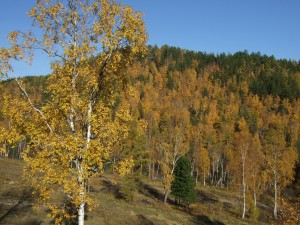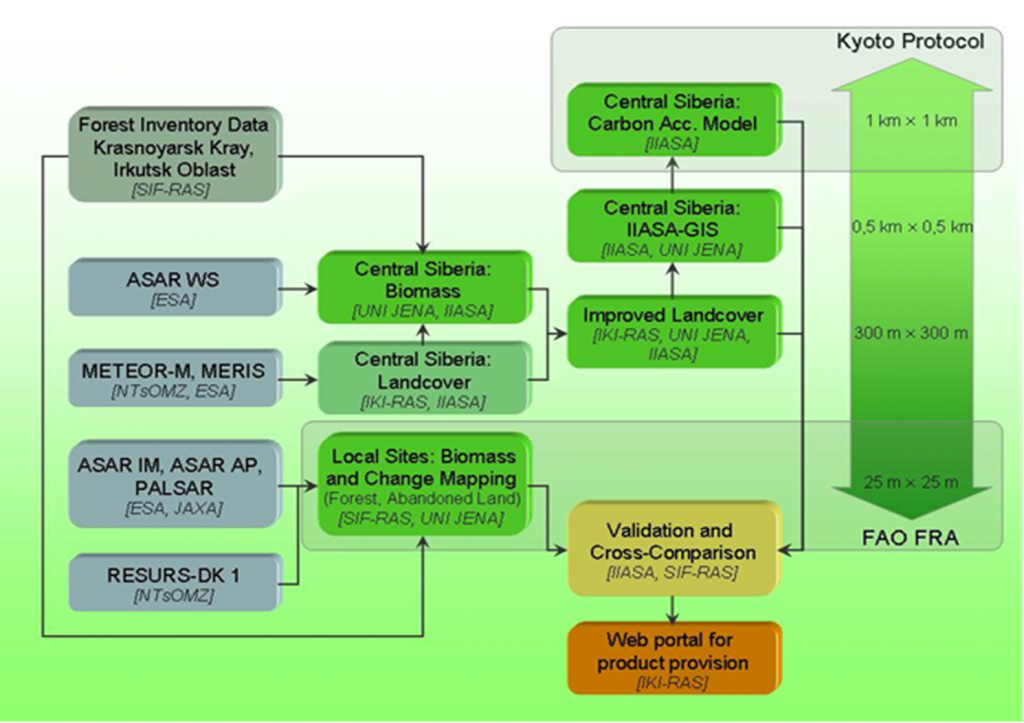Siberian Insights on Global Warming
In times of climate change, the forests of Central Siberia act as valuable carbon sinks. The ZAPÁS project brings Russian and European partners together, aiming to enhance the procedures and products in the field of Earth observation for forest resource assessment and monitoring.
Forests play a pivotal part in Earth’s carbon balance. Hence our ability to fully understand and quantify the impact that vast forests have on the global environment is important for the monitoring of international agreements aimed at CO2 reductions. In Eurasia, the forests in Central Siberia are important carbon sinks. The EU and Russia share an interest in generating a better understanding of the biological processes that are at play across these immense lands.
ZAPÁS paves the way for enhanced forestry Carbon Accounting from space, joining European and Russian expertise
Earth observation data provide valuable solutions in this respect, since remote sensing from satellites enables monitoring of large and remote land areas and the production of biophysical products. Specifically, Radar satellites facilitate the generation of biomass maps. Such maps may be used to obtain information about biomass change over several years, and feed into advanced carbon accounting models. The ZAPÁS project responds to the demand for better carbon forestry data.
The project brings European and Russian researchers together, and jointly they intend to exploit the richness of Earth observation data from European and Russian satellites, such as ENVISAT MERIS and ASAR, and METEOR-M and RESURS-DK1. This collaboration is set to lead to the development of first biomass maps, and biomass change maps for the years 2007, 2008, and 2009 on a local scale, as well as improved biomass and land cover maps at regional scale. Moreover, the project will generate a 1 km scale land cover map as input to a carbon accounting model, which will facilitate improved European-Russian reporting on the implementation of the Kyoto Protocol.
Indeed, ZAPÁS’ foreseen development and validation of a terrestrial ecosystem Full Carbon Account for a large area is promising.
ZAPÁS – Concept and Objectives
ZAPÁS (Rus.: Запaс) – was chosen as project acronym since this Russian word is used in forest terminology for growing stock volume or forest stock, which is one of the envisaged products of this project. Addressing the important issue of assessing forest resources in the boreal zone, particularly in Siberia, the ZAPÁS project is aiming to actively support the EU-Russia Space Dialogue. ZAPÁS delivers innovative procedures and new products for forest resource assessment and monitoring using jointly ESA and ROSCOSMOS satellite data.
ZAPÁS focuses on the synergistic exploration of Earth Observation (EO) data provided by ESA and ROSCOSMOS and on the exchange of methodological know-how in processing Earth Observation data. The team consists of a balanced distribution of leading experts from Europe and Russia in the field of Earth observation for forestry applications, involving Russian stakeholders, i.e. the Sukachev Forest Institute of the Russian Academy of Sciences, who themselves apply remote sensing techniques. The Russian partners come from two geographically different federal regions: the city of Moscow and the Krasnoyarsk Kray.
ZAPÁS investigates and cross-validates methodologies using both Russian and European Earth observation data to support developing a worldwide observation system. Earth observation data include ENVISAT MERIS and ASAR (and ALOS PALSAR) in different acquisition modes, METEOR-M1 and RESURSDK1 (Fig. 1). The methodologies include state-ofthe-art optical and radar retrieval algorithms and their improvement as well as investigation of innovative synergistic approaches. Products include:
- forest biomass maps and biomass change for the years 2007-2008-2009 on local scale
- a biomass and improved land cover map on regional scale, and in addition
- a 1 km scale land cover map as input to a carbon accounting model


